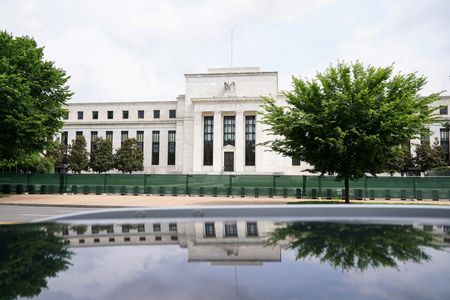By Anisha Sircar, Lisa Pauline Mattackal and Divya Chowdhury
(Reuters) – There is a greater chance of the U.S. Federal Reserve raising interest rates too far and tipping the economy into a recession, strategists and fund managers told the Reuters Global Markets Forum (GMF).
“The biggest risk is that the Fed overdoes it since inflation tends to react quite slowly to higher rates, likely even more so this cycle given still not fully understood distortions to the economy caused by the COVID pandemic,” said Nick Brooks, head of investment and economic research at ICG.
While rate futures markets are still pricing in a 75-basis-point hike at the Fed’s meeting next week, they now expect only a half-point increase in December and no more than a half a point further over the next two meetings.
However, central bank officials are unlikely to ease their aggressive stance without stronger evidence that inflation is slowing, said Jonathan Liang, head of investment specialists, Asia ex-Japan, global fixed income, currency & commodities group at JPMorgan Asset Management.
“We give it better than even odds that next year, we’ll see a recession in the United States,” Liang said, adding current strength in the U.S. labor market and consumer balance sheets “gives the Fed a lot of runway to continue hiking.”
U.S. consumer spending has remained strong, rising more than expected in September, despite underlying inflation pressures continuing to bubble.
The Fed’s focus on these currently strong consumer-driven economic indicators is likely to delay any decision to “pivot” to a more dovish stance, which could pose a policy headache if recession sets in, said Alex Gurevich, chief investment officer at HonTe Investments.
“If you look at stocks and asset prices, you would probably expect the Fed to be already easing by now,” Gurevich said.
The Bank of Canada’s decision on Wednesday to slow its interest rate hikes in light of a darkening economic outlook has prompted some to wonder if the Fed would follow a similar path.
However, Anita Gupta, head of equity strategy at Emirates NBD, told the forum it was “too early” to draw conclusions for other central banks from this move.
“If you’re going downhill and pushing your foot on the accelerator, it’s going to be very hard to break,” Gurevich said.
“I feel it’s already too late for them to stop deflation and a recessionary cycle.”
(Join GMF, a chat room hosted on Refinitiv Messenger: https://refini.tv/33uoFoQ)
(Reporting by Lisa Pauline Mattackal and Anisha Sircar in Bengaluru and Divya Chowdhury in Mumbai; Editing by Anil D’Silva)

